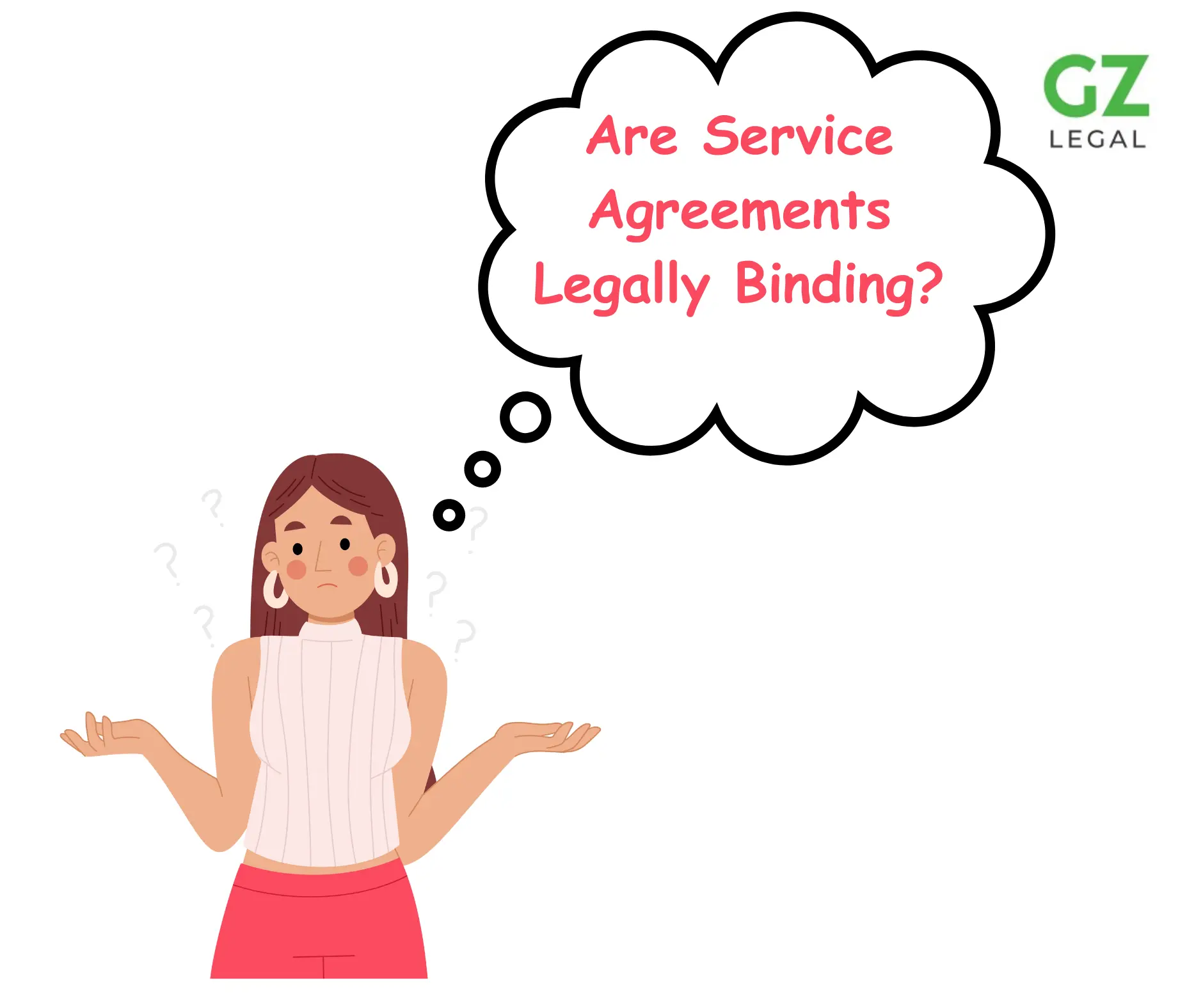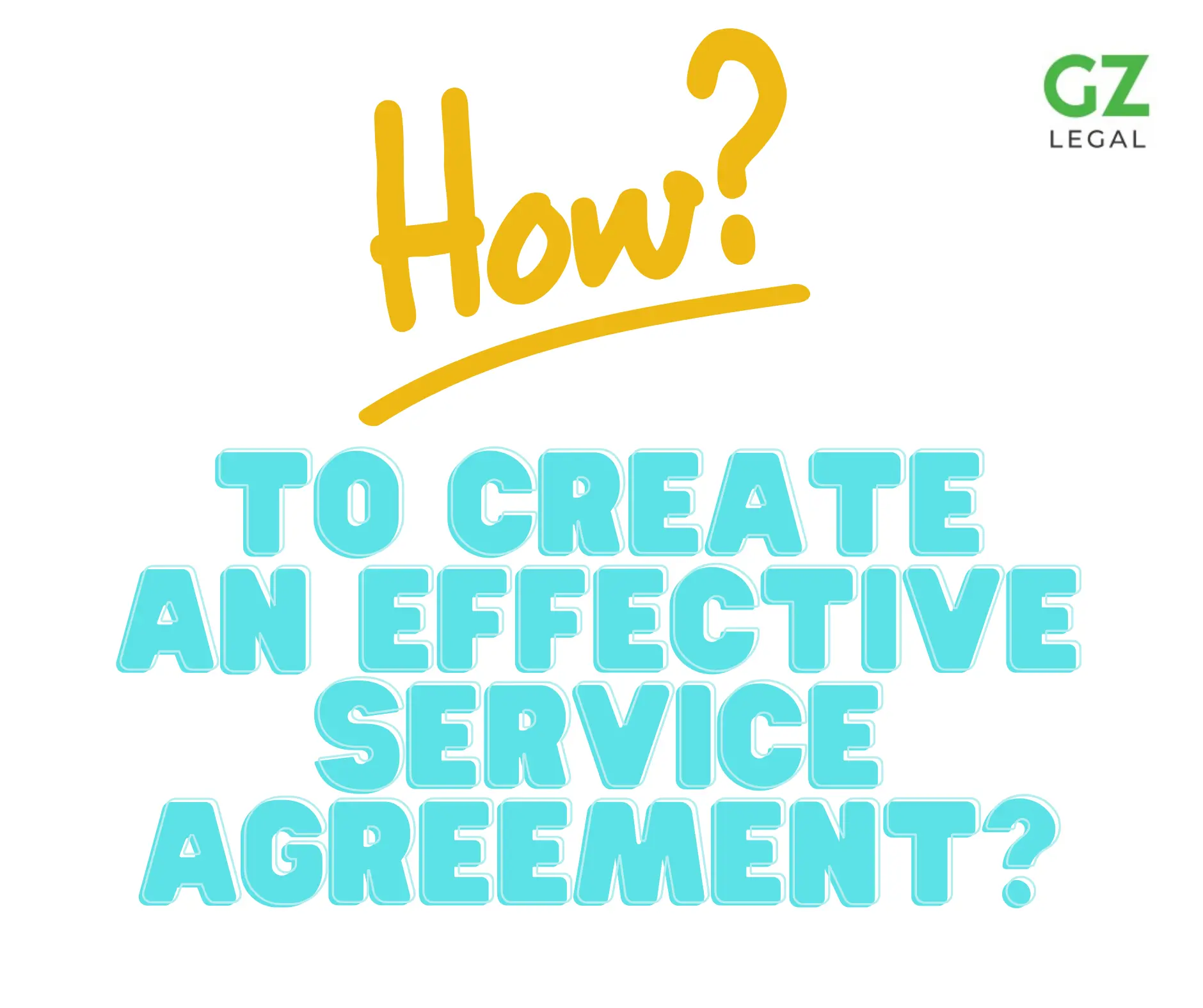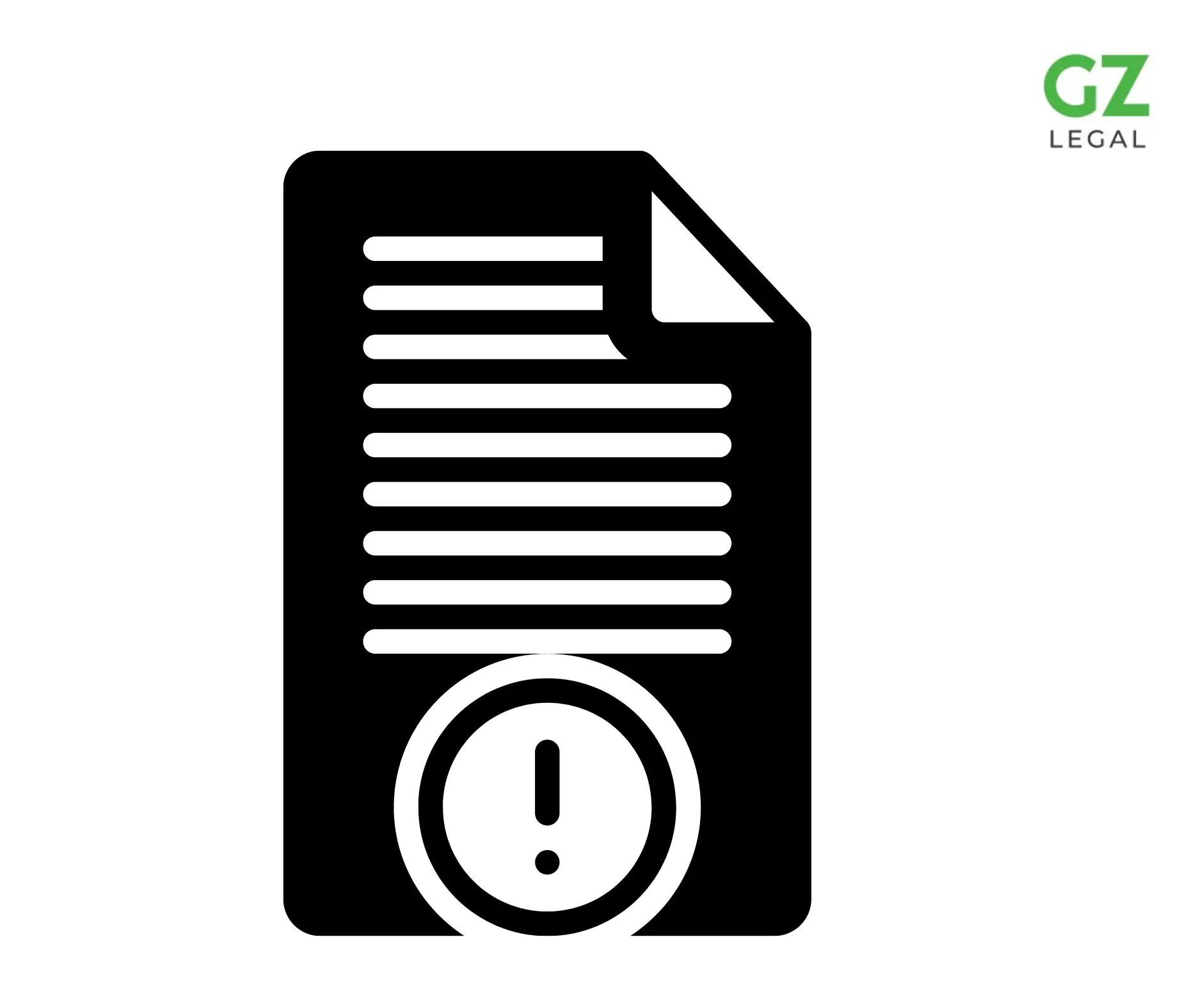Malcolm ZoppiSun Oct 15 2023
Are Service Agreements Legally Binding? A Concise Guide
Service agreements can be legally binding if they fulfill the essential elements of a contract.

Service agreements are an essential aspect of conducting business, as they lay out the terms and conditions under which a service provider will offer its services to a client. These agreements can cover a wide range of services, from IT support to cleaning and maintenance. However, one question that often arises among business lawyers is whether these service agreements are legally binding in the same way that contracts are, and what it takes for them to be enforceable under the law.
The short answer is that service agreements can indeed be legally binding, provided that they fulfill the necessary criteria for forming a contract. Essentially, a contract is formed when there is an offer, acceptance, and consideration between two or more parties. A service level agreement (SLA), for example, records a common understanding about services, priorities, responsibilities, guarantees, and warranties between a customer and a service provider. If these conditions are met, the service agreement can be considered a legally binding agreement, enforceable by law.
Key Takeaways
- Service agreements can be legally binding if they fulfill the criteria for contract formation
- SLAs are an example of service agreements and involve a common understanding between the customer and the service provider
- Contracts are formed through offer, acceptance, and consideration between two or more parties.
Understanding Service Agreements
Service agreements, also known as service level agreements (SLAs), are agreements negotiated between two parties – the customer and the service provider. These agreements are essential for establishing clear communication and setting expectations on services, priorities, responsibilities, guarantees, and warranties.
In many cases, service agreements can be legally binding, but they must fulfil certain requirements to be considered a contract under contract law. A legally binding contract must have an offer, acceptance, consideration, and the intention to create legal relations.
When reviewing a service agreement, it is important to understand the scope of work outlined. This should include details on the services provided, timelines, and quality standards that are agreed upon by both parties. It is also beneficial to ensure that the agreement mentions any potential penalties or remedies if the service provider fails to meet the specified criteria.
It is worth noting that not all service agreements are legally binding contracts. Some agreements may lack one or several key factors necessary for a contract to be legally binding. For example, if there is no actual consideration or there is no intention to create legal relations, then the agreement cannot be considered a legally enforceable contract.
To make sure your service agreement holds up as a legally binding contract, ensure that it includes all the essential elements, and both parties have a clear understanding of their roles and responsibilities. Remember, a well-drafted service agreement protects both the customer and the service provider, making it a critical component in any professional or business relationship.
Nature of Legality in Service Agreements
In the realm of business transactions, service agreements play a vital role. They are an integral part of commerce, and you may encounter them frequently in your personal or professional life. Understanding the nature of legality in service contracts and agreements can help you navigate these agreements and ensure you are entering into a legally binding arrangement.
When it comes to the legality of service agreements, the key aspect to consider is whether or not the agreement is a legally binding contract. A legally binding contract is an agreement that creates a legal obligation for the parties involved. This means that if one party fails to fulfil their part of the contract, the other party has the right to pursue legal remedies.
To be considered legally binding, a contract must satisfy a few essential elements, namely:
- Intention to create legal relations: The parties involved must have the intention of entering into a legally binding agreement. This intention is typically based on the parties’ mutual understanding and conduct.
- Consideration: Something of value must be exchanged between the parties, such as money, goods, or services, in return for a promise or undertaking.
- Certainty: The terms and conditions of the contract must be clear and concise, allowing the parties to understand their respective rights and obligations.
If these elements are present in a service agreement, it has the potential to be a legally binding document. However, there are certain situations where a contract may be deemed non-binding or voidable. These scenarios include instances where the parties have not reached a genuine agreement or where the agreement involves illegal activities. It is also crucial that the parties entering the contract have the legal capacity to do so, which includes factors like age and mental capacity.
In summary, service agreements may qualify as legally binding contracts if they satisfy the essential elements of intention, consideration, and certainty. To ensure you are engaging in a legally binding services agreement, and protect your rights, it is essential to understand the nature of legality in service agreements. By doing so, you can navigate these agreements confidently and ensure your interests are safeguarded within the bounds of the law.
Essential Elements of a Binding Agreement
When it comes to service agreements, understanding the essential elements of a legally binding service contract is crucial. This will ensure that your agreement is enforceable and provides the desired level of protection for both parties.
Offer lies at the foundation of a binding agreement. One party must make an offer to another, expressing their intention to enter into a contract under specific terms. This offer should be clear, definite, and communicated to the other party.
Acceptance is the second crucial element, where the other party agrees to the terms of the offer. This can be done in writing, verbally, or even through conduct. It is important to ensure that the acceptance is unconditional, meaning there are no changes or additions requested to the initial offer.
Another key element is consideration. In a binding agreement, each party should provide something of value to the other. Consideration could involve a promise to pay money, provide services, or undertake specific actions. This exchange of value is essential for the agreement to be legally enforceable.
Intention to create legal relations is an important aspect of a binding agreement. Both parties must have a clear understanding that the agreement is legally enforceable and can be subject to legal repercussions for non-compliance. This intention distinguishes a contract from a mere social or domestic agreement.
Finally, capacity plays a crucial role in the formation of a binding agreement. All parties involved must have the legal capacity to enter into a contract. This includes being of legal age, mentally sound to understand the terms and consequences, and having the authority to sign on behalf of any represented entities such as companies or organisations.
In summary, for a service agreement to be legally binding, it must contain an offer, acceptance, consideration, intention to create legal relations, and the capacity of the parties involved. By ensuring these elements are present, you can create a solid and enforceable service agreement that protects the interests of all parties involved.
Common Clauses in Service Agreements
Service agreements, also known as Service Level Agreements (SLAs), are legally binding contracts between two parties, usually the customer and the service provider. These contracts outline the services provided, responsibilities, priorities, and guarantees. Here are some common clauses to consider when drafting a service agreement:
- Guarantee: A guarantee clause ensures that the service provider promises a certain level of performance or quality in the services they provide. You might encounter clauses mentioning warranties or guarantees related to the services rendered or the outcome of the services. It’s crucial to clearly outline the scope and limitations of these guarantees.
- Scope of Services: This clause specifies the services to be provided by the service provider. It should be detailed and clear in order to avoid any misunderstandings or disputes over what is included in the agreement.
- Payment Terms: The payment terms clause outlines the fees, payment schedule, and value of the services provided. This includes information on billing, whether the payment will be made in instalments or as a lump sum, and any late payment penalties or interest charges.
- Intellectual Property: Intellectual property clauses address the ownership and use of any intellectual property (IP) created or used during the course of the service agreement. This may involve the transfer of IP rights or licenses to use specific IP, ensuring that both parties understand their rights and responsibilities regarding the use and protection of any sensitive information.
- Employment: A service agreement may include clauses related to employment, such as the relationship between the parties (independent contractor or employee), confidentiality, and non-compete agreements. Ensure that your rights and responsibilities as an employer or service provider are clearly defined within the contract.
- Termination: Termination clauses establish the conditions under which the service agreement can be terminated by either party. This includes notice periods, force majeure events, and potential breaches of contract. Being clear about the terms of termination can help protect your interests in the event of a dispute.
- Liability and Indemnification: These clauses outline each party’s liability in the event of any loss or damage resulting from the services provided or negligence during the term of the agreement. Indemnification provisions allocate responsibility for losses between the parties and may specify any limitations or caps on liability.
- Dispute Resolution: Lastly, a dispute resolution clause specifies the process for resolving disputes between the parties. This may involve negotiation, mediation, arbitration, or even litigation. Including a well-defined dispute resolution process can help avoid lengthy and costly legal battles.
By understanding these common clauses, you can ensure your service agreements are comprehensive and protect your interests in your business relationships.
Consequences of Breach
When you breach a service agreement, it means that you have failed to comply with the terms of a legally binding contract. This can lead to several consequences for both parties involved – the breaching party and the non-breaching party.
Firstly, the non-breaching party may choose to pursue a claim against you for damages. This could involve seeking compensation for any losses they have suffered as a result of your breach. To succeed in such a claim, the non-breaching party must prove that they have indeed suffered a loss and that the loss was directly caused by your breach of the service agreement.
In some instances, the non-breaching party might prefer to resolve the dispute through alternative methods, such as negotiation, mediation or arbitration. These methods might be more cost-effective and less time-consuming than litigation and can help to maintain a positive working relationship between the parties.
It is always prudent to seek legal advice from a qualified solicitor when facing a breach of a service agreement. A solicitor can provide you with guidance on your rights and obligations under the contract, as well as the possible consequences you might face in the event of a breach. They can also advise you on the best course of action to resolve the dispute, such as whether to pursue litigation or opt for alternative dispute resolution methods.
If you are found to have breached the service agreement and are liable for damages, you may be required to pay the non-breaching party to compensate them for their loss. The amount of damages will be determined by the courts, taking into account factors such as the nature of the breach, the impact on the nonbreaching party, and the efforts made by both parties to mitigate any losses.
In conclusion, breaching a service agreement can have several consequences including financial, reputational and potential legal ramifications. To avoid breaching a service agreement, ensure that you fully understand your obligations outlined in the contract and seek legal advice if necessary.
Role of HR and Staff

As an HR professional, your role is crucial in ensuring that service agreements between the employer and employees are legally binding. Service agreements, just like contracts of employment contracts, are legally binding agreements between the employer and employee. They clearly outline the roles, responsibilities, and rights of each party.
It’s vital that you, as an HR professional, work closely with your staff to create clear, concise, and legally binding service agreements. This collaboration with staff can help prevent misunderstandings and disputes further down the line. Your expertise in employment law is essential in ensuring the agreements contain all necessary clauses and adhere to relevant legislation.
When drafting a service agreement, keep the following points in mind:
- Clearly outline the roles and responsibilities of each party.
- Include terms and conditions in a written document, providing a solid basis for a legally binding agreement.
- Ensure the agreement complies with all relevant UK employment laws.
As an employer, it’s your responsibility to provide each employee with a legally binding service agreement. This can be done verbally or in writing, but having a written document is generally considered best practice. Ensure that all employees understand the terms and conditions of their full employment contract, as well as any specific clauses within their service agreement.
Staff members also have a responsibility in ensuring service agreements are legally binding. They and clients should read the terms and conditions thoroughly, ask any questions to ensure clear understanding, and sign to confirm their agreement.
Together, HR and staff can create legally binding service agreements that protect the rights and responsibilities of both the employer and the team of employees, providing a strong foundation for successful employment relationships.
Importance of Communication

Effective communication is crucial when it comes to service agreements. It ensures that both you and your customers have a clear understanding of the terms and conditions involved. By fostering open channels of communication, you can avoid potential pitfalls and misunderstandings that could jeopardise the legally binding nature of your agreement.
Take the time to explain the essential terms of the agreement to your customers and encourage them to ask questions. This ensures that all parties are on the same page and have a proper understanding of their respective rights and responsibilities. Remember, a well-informed customer is more likely to appreciate the value of your services and engage with your business in a positive manner.
Ensure that all relevant information is documented and shared with your customers in a timely and accessible manner. This includes not just the core terms and conditions outlined in the service agreement but any subsequent updates or modifications as well. By providing this documentation in a concise and easy-to-understand format, you help your customers make informed decisions and uphold their end of the bargain more consistently.
Listen carefully to the feedback and concerns of your customers, as this can help you improve your service offerings, refine your agreements and develop a stronger rapport with your clientele. By maintaining an open line of communication, you can address any issues that might jeopardise the legality of your agreement, and work together to find mutually acceptable solutions.
In summary, effective communication is an indispensable tool for building strong, legally binding service agreements. By engaging with your customers in a confident, knowledgeable, and clear manner, you foster their trust in your business and establish a solid foundation for successful, long-term collaboration.
Digital Aspects of Service Agreements
In today’s digital age, service agreements play a crucial role in defining the expectations and responsibilities between customers and service providers. Not only are these agreements enforceable, but they also need to address a range of digital aspects like GDPR compliance, marketing practices, and outsourcing.
When it comes to data protection, the General Data Protection Regulation (GDPR) ensures that your personal data is treated with care and respect. When entering into a service agreement, you should ensure that the provider is GDPR compliant, and that any data processing activities are outlined in the contract. This will protect your rights and ensure that personal information stays secure.
Online marketing is another important aspect of service agreements. It’s important to clarify how marketing campaigns will be conducted, and whether the provider has the right to use your brand or company name in their promotional materials. Additionally, you should clarify whether any marketing activities will be outsourced to third parties, and if so, how those relationships are managed.
Outsourcing is another key aspect businesses have to consider in service agreements. Ensure that the contract outlines the responsibilities of the service provider and any subcontractors, detailing how performance will be monitored and ensuring that any outsourced work meets your desired quality standards. It’s also essential to understand how intellectual property rights and confidentiality are protected when outsourcing, as this is vital to preserving your business’s competitive advantage.
In the digital realm, contracts can be signed electronically, with email footers or e-signatures often holding the same legal weight as a traditional handwritten signature. Smart contracts are also developing in importance, and these digital agreements are generally enforceable when they adhere to basic contractual rules, such as offer, acceptance, and consideration.
By addressing these digital aspects in your service agreements, you can confidently and effectively engage with service providers, while remaining protected by clear, enforceable terms.
How to Create an Effective Service Agreement

To create an effective service agreement, it is essential to follow a series of steps that will ensure the document is clear, comprehensive, and legally binding. Here, we provide some advice in a confident, knowledgeable, neutral, and clear tone to help you create a strong service agreement.
Firstly, identify the parties involved in the agreement. Clearly state the names and contact information of both the service provider and the customer. This will help avoid any confusion or misunderstandings later on.
Next, outline the scope of services to be provided. This should include a detailed description of the services, as well as any specific deliverables and deadlines. Be precise and clear about what is expected from both parties. It is also useful to include any limitations or exclusions to the services provided.
When negotiating the terms of the agreement, ensure that both parties are on the same page. Discuss and agree upon essential aspects such as pricing, payment terms, and performance standards. A well-defined service level agreement (SLA) can help set expectations regarding the quality and timeliness of service delivery.
As you conduct this negotiation process, seek legal advice from a solicitor or a qualified expert. This will ensure that your service agreement abides by the relevant laws and regulations in your jurisdiction. They can also provide guidance on any specific clauses or provisions that should be included in the document.
Another key aspect to consider is the term and termination of the agreement. Define the contract’s length, as well as any renewal or extension options. Additionally, outline the circumstances under which the agreement can be terminated, the required notice period, and any potential penalties legal fees or consequences for early termination.
Address liability and dispute resolution clauses within the service agreement. Clearly outline each party’s responsibilities and liabilities in the case of a breach, failure to perform, or any issues that might arise during the service provision. Specify how future disputes that will be handled, whether through negotiation, mediation, arbitration, or litigation.
Lastly, don’t forget to include any additional clauses that may be relevant to your specific situation, such as a confidentiality clause, non-compete, or non-solicitation agreements. These clauses can help protect sensitive information or prevent unfair competition.
Remember to review the document thoroughly and ensure that it complies with all legal requirements. Once both parties are satisfied with the content, have the service agreement signed and dated by the authorised representatives of both parties to make it legally binding.
Exceptions and Special Circumstances

In certain cases, service agreements may not be legally binding. Understanding these exceptions and special circumstances can help you ensure your agreements are enforceable.
Common law principles may affect the binding nature of a service agreement. For instance, if there is a lack of consideration (exchange of value) between the parties, the agreement may not be enforceable. Additionally, agreements made under duress or undue influence are likely to be deemed unenforceable.
Disability can also impact the validity of a service agreement. If a party lacks the mental capacity to understand the terms or implications of an agreement, it may not be legally binding.
Authority is another factor to consider. For a service agreement to be legally binding, the parties entering into the agreement must have the necessary authority to do so. If a person enters an agreement on behalf of a company without proper authority, the agreement may not be enforceable against the company.
Unfair contract terms can render some provisions of a service agreement unenforceable. Unfair terms can include those that significantly disadvantage one party, limit liability unfairly, or are not transparent and explicit.
Fraud can also prevent a service agreement from being legally binding. If one party knowingly makes false representations or conceals material information to induce the other party into entering the agreement, the contract is likely to be deemed unenforceable.
To ensure a service agreement is enforceable, it is important that the agreed terms are realistic and achievable. If the terms are deemed impossible or unethical, a court may refuse to enforce the agreement.
Finally, if a counteroffer is made in any form in response to an initial offer, the original offer becomes void and a legally binding contract only forms upon acceptance of the counteroffer. Thus, it is crucial to understand that a counteroffer can impact the enforceability of a service agreement.
Frequently Asked Questions
Are there specific clauses that make service agreements enforceable?
Yes, there are specific clauses that make service agreements enforceable. These clauses should clearly define the scope of work, payment terms, confidentiality, dispute resolution, and termination procedures. Providing detailed information in these clauses can help establish a legally binding service agreement and ensure that both parties understand their obligations.
What key elements must be present in a service agreement to be legally binding?
For a service agreement to be legally binding, it must have the following elements:
- Agreement: Both parties must agree on the terms of the service being provided.
- Intention: Parties must intend the agreement to be legally binding.
- Consideration: There must be an exchange of value between the parties, such as payment for services rendered.
- Certainty: The terms of the agreement must be sufficiently clear and complete to be enforceable.
Meeting these criteria will help ensure that a service agreement is legally binding.
How does a service agreement differ from standard contracts?
Service agreements are a type of contract that specifically outline the provisions of a service between a client and a service provider. While standard contracts can cover a wide range of agreements such as sales, partnerships, or leases, service agreements are focused on defining the scope of work and expectations for services rendered.
Can a non-written service agreement still be considered legally binding?
Yes, a non-written service agreement can still be considered legally binding, provided it meets the necessary criteria. However, having the agreement in writing is strongly recommended as it provides clear evidence of the terms and helps avoid misunderstandings or disputes. Written agreements are also easier to enforce in the event of a breach by either party.
Under what circumstances can service agreements be deemed unenforceable?
Service agreements can be deemed unenforceable under certain particular circumstances, such as:
- Lack of a key element: If any of the key elements for a legally binding contract, like agreement, intention, consideration, or certainty, are missing.
- Illegality: If the agreement involves activities that are illegal or contrary to public policy.
- Fraud or misrepresentation: If any party has made false statements or concealed important information to induce the other party into the agreement.
- Duress or undue influence: If a party is coerced or unduly influenced into entering the agreement.
In these cases, the service agreement may be considered invalid or unenforceable.
What should be included in a service agreement between two companies?
A service agreement between two companies should include:
- Scope of work: Clearly outline the services to be provided and describe the expected outcomes and deliverables.
- Payment terms: Define the fees, payment structure, and invoicing process.
- Duration and timeline: Specify the start and end dates or milestones for the services.
- Confidentiality: Establish the expectations regarding the handling of sensitive information.
- Dispute resolution: Define a process for resolving conflicts or disagreements that may arise.
- Termination: Outline the terms and conditions for terminating the agreement, including notice periods and grounds for termination.
Having a comprehensive service agreement in place helps protect both parties and ensures smooth collaboration in the course of providing services.
Find out more!
If you want to read more in this subject area, you might find some of our other blogs interesting:
- Step-by-Step Guide on How to Transfer Shares to a Holding Company
- Breach of Settlement Agreement: Consequences and Remedies Explained
- Who Gets the Money When a Company is Sold?
- What is a Counter Offer in Contract Law? Explained Simply and Clearly
- Understanding the Costs: How Much Do Injunctions Cost in the UK?